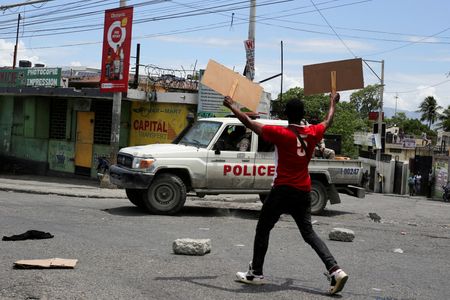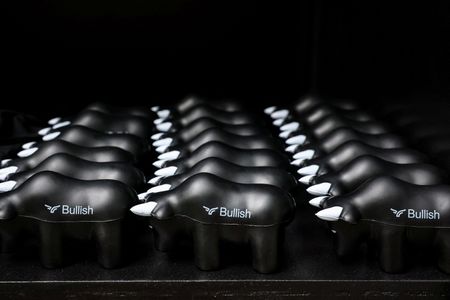By Anna Hirtenstein and Sarah Morland
August 14 (Reuters) – The prominent Donald Trump supporter and private security executive Erik Prince says he plans to keep his forces in Haiti for 10 years under an arrangement that will eventually give his firm a role in the country’s tax-collection system.
In an interview with Reuters, Prince said his company, Vectus Global, had reached a 10-year agreement with the Haitian government to fight the country’s criminal gangs and set up a tax collection system. After the security situation is stabilized, the firm would be involved in designing and implementing a program to tax goods imported across Haiti’s border with the Dominican Republic, he said.
He said he expected to wrestle control of major roads and territories from the gangs in about a year. “One key measure of success for me will be when you can drive from Port-au-Prince to Cap Haitian in a thin-skinned vehicle and not be stopped by gangs,” Prince said in the interview.
Prince would not comment about how much the Haitian government would pay Vectus Global, nor how much tax he expects to collect in Haiti.
The new president of the transitional council, Laurent Saint-Cyr, who was inaugurated on August 7 as part of a planned rotation of council leaders, did not respond to requests for comment. Haiti’s former council president and prime minister also did not respond to requests for comment.
Vectus began operating in Haiti in March, deploying mainly drones in coordination with a task force led by the prime minister, but the long-term engagement and the involvement in tax collection have not been previously reported.
A person familiar with the company’s operations in Haiti told Reuters that Vectus would intensify its fight against the criminal gangs that control large swathes of Haiti in the coming weeks, deploying several hundred fighters from the United States, Europe and El Salvador who are trained as snipers and specialists in intelligence and communications, as well as helicopters and boats.
Prince, a former U.S. Navy Seal, founded the Blackwater military security firm in 1997. He sold the company in 2010 after Blackwater employees were convicted of unlawfully killing 14 unarmed civilians while escorting a U.S. embassy convoy in Baghdad’s Nisour Square. The men were pardoned by Trump during his first term in the White House.
EXPANDING ROLE
Since Trump’s return to the White House, Prince has advised Ecuador on how to fight criminal gangs and struck a deal with the Democratic Republic of Congo to help secure and tax its mineral wealth.
“It’s hard to imagine them operating without the consent of the Trump administration,” said Romain Le Cour Grandmaison, head of the Haiti program at Geneva-based Global Initiative Against Transnational Organized Crime.
When asked for comment about Le Cour Grandmaison’s assertion, a State Department spokesperson said it has not hired Prince or his company for any work in Haiti.
A senior White House official said: “The U.S. government has no involvement with the private military contractor hired by the Haitian government. We are not funding this contract or exercising any oversight.”
It’s unclear whether Prince’s contract would be affected by the change of leadership in Haiti earlier this month.
In an August 7 televised address, Saint-Cyr said he welcomed more international support to fight the gangs. “I am inviting all the international partners to increase their support, send more soldiers, provide more training,” he said. “Help us with a more robust international force.”
The crisis in Haiti has worsened in recent years, as armed gangs gained territory and attacked hospitals, police stations and prisons, taking control of strategic transport routes and extorting funds from the population. Rights groups accuse the gangs of massacres, rapes, kidnappings and arson. About half the population is food-insecure and over 8,000 people in displacement camps face famine-level hunger.
Haiti used to collect half of its tax revenue at the border with the Dominican Republic, but gang control of key transport routes has crippled trade and cut off state income, a report commissioned last year by Haiti’s government and several multilateral organizations found. This has undermined the government’s ability to respond to the crisis or deliver basic services, the report said.
The Dominican Republic is a key source of grains, flour, milk, water and other food staples for Haiti, according to customs data. Haiti also relies on imports from the Dominican Republic for textiles, consumer goods, and medical supplies.
Security contractors working in Haiti have faced challenges operating in a country with entrenched links between the gangs, local police and some factions of the government.
Earlier this year, a team from American security firm Studebaker Defense abandoned their mission in Haiti after two of their members were abducted, likely due to corrupt police officials, the New York Times reported.
Mounir Mahmalat, who serves as a country coordinator of the World Bank’s Fragility, Conflict and Violence Group, said that it was virtually impossible to ensure the safe transport of goods or the security of people working in Port-au-Prince.
Other security firms working in Haiti have raised questions about how Vectus would hold onto cleared gang territory as well as the wisdom of channelling resources to private security firms instead of the country’s own security forces.
“Resorting to private military companies cannot be seen as a solution to insecurity in Haiti,” said Gedeon Jean, head of Haiti’s Center for Human Rights Analysis and Research. “The use of private companies has often resulted in human rights violations.”
While a private force could help police restore security, Jean warned against large spending on a foreign company while Haiti’s own security forces lack funds and equipment.
(Reporting by Anna Hirtenstein in London, Sarah Morland in Mexico City and Harold Isaac in Port au Prince. Editing by Suzanne Goldenberg)















